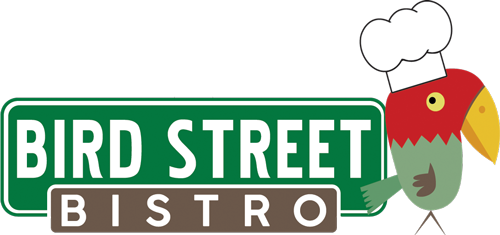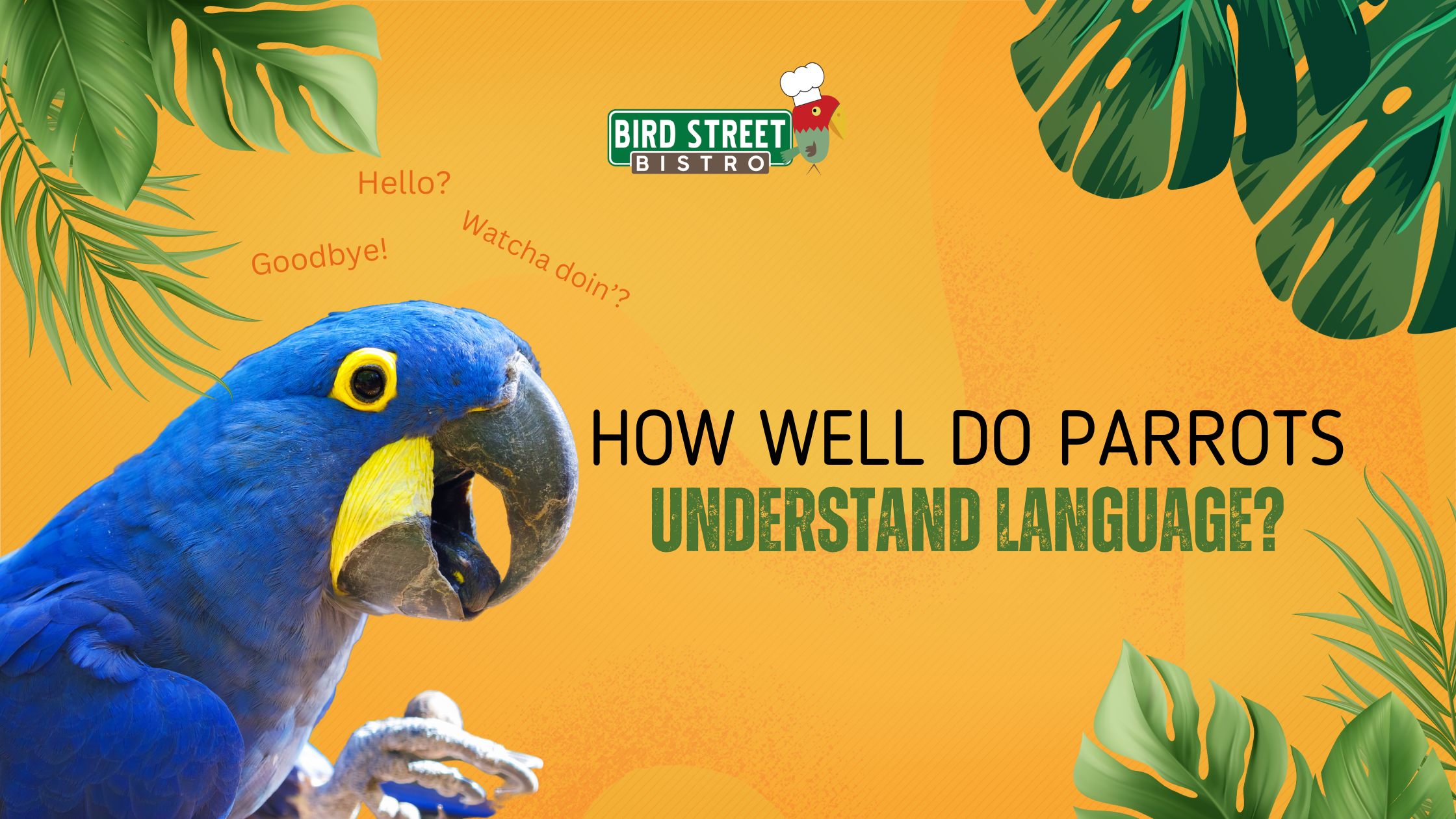How Well Do Parrots Understand Language?
In 2014, a British family was overjoyed to find their beloved African grey parrot, Nigel, after he had been missing for four years. However, the reunion came with a big surprise: when Nigel came home, he was speaking Spanish!
As it turns out, Nigel had been taken in by a Spanish-speaking family. In the four years he spent in his new home, he picked up Spanish phrases, learned the names of the family’s dogs, and figured out how to whistle the theme from the movie The Good, the Bad, and the Ugly.
If you have a parrot that loves repeating the things you say, this story might not be too surprising. Parrots are highly observant animals that soak up information like sponges. But when parrots speak, how much do they really mean, and how much is simple mimicry? And why are parrots such accomplished linguists, anyways?
Are Our Parrots Really Talking?
First, it’s important to understand that just because a parrot uses a word doesn’t mean they necessarily know its meaning. Dr. Irene Pepperberg, an animal cognitive scientist famous for her work with the African grey parrot Alex, has written extensively about parrots’ abilities to learn and use language. In a 2010 paper, she asserts that without careful training, it is unlikely that parrots use words with referential, communicative intent.
Put another way, a parrot that repeats a phrase like “how are you” probably doesn’t understand the full meaning behind what they are saying. But don’t be fooled–this mimicry is still the result of complex cognitive processes! These vocalizations can serve many purposes, including attracting attention, garnering praise, and making our parrots feel more included in their human “flocks.”

Additionally, even if a parrot doesn't know what a word or phrase means, they can understand the context and timing of when it should be used. For example, a parrot might say “good morning” when their owner enters the room. Even though the parrot doesn’t quite grasp what the words “good” or “morning” mean, they know the appropriate context (seeing their owner for the first time in a while) in which to use the phrase.
It is sometimes possible to teach parrots the meanings of words. Over the course of his lifetime, Alex the parrot developed a rich vocabulary, eventually learning to identify and sort objects on the basis of color, material, size, and quantity. Moreover, he sometimes combined multiple words to describe things that were new to him. For example, he referred to cake as “yummy bread” and to an apple as a “bannery,” probably because it “tasted a bit like a banana and looked like a big cherry,” according to Dr. Pepperberg.
Teaching parrots to associate words with meanings takes active, intentional training. In Alex’s case, this training involved two people socially interacting with him and each other, carefully posing questions, giving responses, and providing constant feedback. Without this kind of rigorous educational program, it’s unlikely that most parrots will make connections between words and meanings on their own.
Are Some Parrots Better Talkers Than Others?
Some of the most up-to-date evidence suggests that certain species of parrots have more of an aptitude for mimicking speech than others. In a 2022 survey, researchers found that Pacific parrotlets and sun conures were among the least likely to copy the things their owners said, while “grey parrots, Amazona parrots, cockatoos, and macaws were generally very accomplished mimics.”
Why? While scientists haven’t settled on a definitive answer, it seems that different species may simply have different preferences when it comes to communication. Just as people have varying conversational proclivities–whether they like to speak over the phone, through text, or face-to-face–different parrot species “talk” with their flocks in various ways.

Take cockatiels, for example. While most parrots in the 2022 study had vocabularies that consisted of a large number of words and only a few non-linguistic sounds, cockatiels tended to demonstrate the reverse, communicating more heavily with sounds than words. This may be the result of cockatiels having a more “musical” nature. Many cockatiels enjoy whistling along to songs, and one study even found that cockatiels enjoy manipulating objects to produce sounds, almost as if they are playing instruments. It makes sense that a more musically-inclined parrot would prefer to communicate with whistled tunes rather than words.
As always, there are exceptions to every rule! No species is a monolith, and there is variation in linguistic ability on an individual-to-individual basis. It was actually a budgie, not an African grey or macaw, that set the Guinness World Record for the most words known by a parrot. Before his death in 1994, Puck the budgerigar was estimated to have a vocabulary consisting of nearly 2,000 words.
How Do Parrots Learn to Speak?

In all the animal kingdom, parrots are unique in their ability to mimic human speech. Even our closest animal relatives, bonobos and chimpanzees, lack the means to replicate language in the way parrots do. It seems that a combination of environmental and physiological factors have contributed to parrots’ remarkable linguistic skills.
As flock animals, wild parrots evolved complex communication skills to transmit information between themselves. Domesticated parrots, finding themselves in “flocks” composed primarily of humans, began adopting the vocalizations of their flockmates (words and phrases) to communicate and cultivate a sense of belonging.
Additionally, a growing body of research seems to show that humans and parrots share some similar brain regions. In humans, the cerebral cortex (the wrinkled, outer layer of the brain) plays a crucial role in many higher cognitive processes, including learning, reasoning, and language use. In the early 2000s, researchers discovered that birds share a similar “cortex-like structure” which contains a density of neurons similar to that of our closest primate relatives.
Wrapping Up
There’s something undeniably endearing about parrots that chime into human conversations. Though they may not fully understand the definitions of the words they use, our quirky and charismatic birds have a way of imbuing their vocalizations with meaning and getting their points across all the same. What’s more, the science behind parrots’ linguistic abilities is advancing steadily. In the future, we can hopefully gain even more insight into the way parrots understand speech and make language their own.
Works Referenced:
Acovino, V., Seshadri, M., Kenin, J., Chang, A., & Kelly, M. L. (2022, December 8). A scientific survey takes a look at “vocal mimicry” in parrots. NPR. https://www.npr.org/2022/12/08/1141645084/a-scientific-survey-takes-a-look-at-vocal-mimicry-in-parrots
Auersperg, A. M., & von Bayern, A. M. (2019). Who’s a clever bird — now? A brief history of parrot cognition. Behaviour, 156(5-8), 391-407. https://brill.com/view/journals/beh/156/5-8/article-p391_1.xml
Benedict, L., Charles, A., Brockington, A., & Dahlin, C. R. (2022). A survey of vocal mimicry in companion parrots. Scientific Reports, 12(1), 20271. https://www.nature.com/articles/s41598-022-24335-x#:~:text=Vocal%20learning%20variation%20by%20species,smaller%20repertoires%20but%20similar%20variability
Cerebral cortex: What it is, Function & Location. Cleveland Clinic. (2022, May 23). https://my.clevelandclinic.org/health/articles/23073-cerebral-cortex
Guardian News and Media. (2014, October 17). Missing Parrot turns up minus British accent and speaking Spanish. The Guardian. https://www.theguardian.com/lifeandstyle/2014/oct/17/missing-parrot-british-accent-speaking-spanish-california
Largest vocabulary for a bird ever. Guinness World Records. (n.d.). https://www.guinnessworldrecords.com/world-records/70967-largest-vocabulary-for-a-bird-ever
Le Covec, M., Aimé, C., & Bovet, D. (2019). Combinatory sound object play in cockatiels: a forerunner of music?. Behaviour, 156(5-8), 595-617. https://www.jstor.org/stable/26737866
Mason, B. (2022, February 25). Do birds have language? Smithsonian.com. https://www.smithsonianmag.com/science-nature/do-birds-have-language-180979629/
Pepperberg, I. M. (2010). Vocal learning in Grey parrots: A brief review of perception, production, and cross-species comparisons. Brain and language, 115(1), 81-91. https://www.sciencedirect.com/science/article/pii/S0093934X09001643
Taylor, A. P. (2023, February 21). Why do parrots talk? Audubon. https://www.audubon.org/news/why-do-parrots-talk- Choosing a selection results in a full page refresh.
- Press the space key then arrow keys to make a selection.


